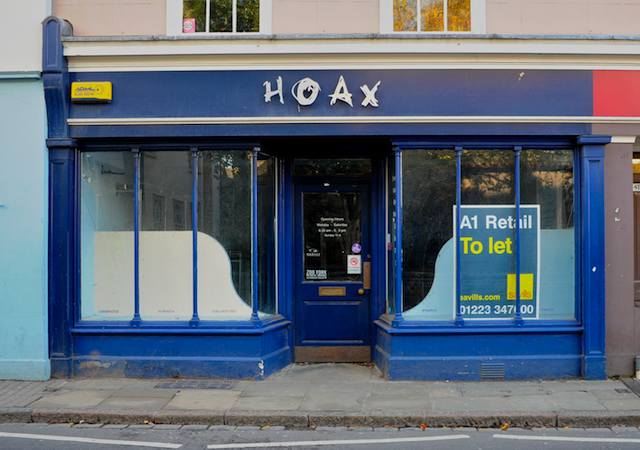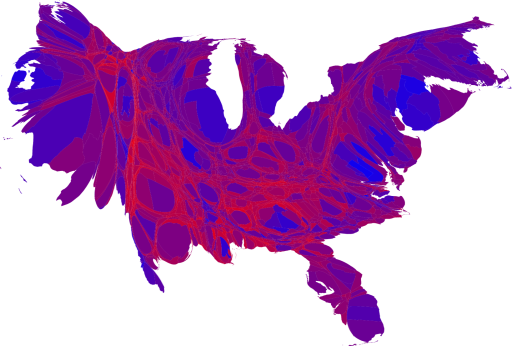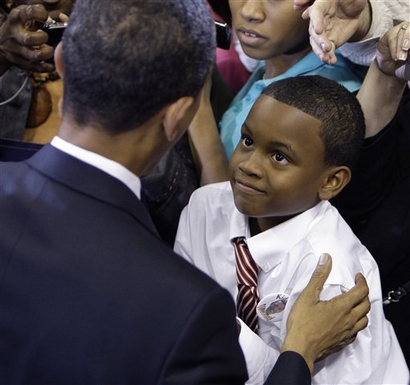
… in a nutshell.


… in a nutshell.
If you want to see how our media ecosystem has changed, then click here. I found it via this insightful blog post by Peter Brantley. His commentary is worth quoting:
What’s notable is that the images are fairly informal — and they are on Flickr. This kind of photostream — not unique in itself — would previously, a generation ago, have been highly curated, entitled “The new presidential family waits for news,” and published the week following in Life or Look magazine. However, the Obama pictures appear less curated (or at least have that air), were published nearly instantly, and do not involve the mediation of traditional media. In fact, whether these are eventually printed or not as official administration photos is secondary, because they are available freely and publicly online.
Without benefit of any mainstream media publicity, the pictures were so popular that they brought down Flickr. Thus, this is an event worthy of notice: an expectation of democratic transparency in a federal government combined with a mere decade plus-old publishing infrastructure jointly craft a community around the globe. In a sense, the limited access of the photographer on that election night make this a callback to the effect of TV in the 1950s, when monolithic media broadcast a culture that was shared and discussed in the conversations of millions. Yet the means of this publication, and the premise of sharing, are profoundly different.
I think there’s one other interesting point to note. Up until this presidency, documentation such as the photoshoot routinely went en masse into archives, where it later established the basis for the Presidential Library. However, existing Presidential Libraries such as LBJ’s or JFK’s are faced with the challenge of reaching back into their collections to digitize materials and make them widely accessible, and they face significant policy, logistical, and funding challenges in doing so. The Obama administration will be publishing a great deal of material outbound — a digitally native presidency — at a magnitude far beyond any of its predecessors.
From Dave Winer…
Barack Obama, who’s running for the Senate in Illinois, spoke briefly at the Blogger’s Breakfast. He’s an up and coming star of the Democratic Party, according to David Weinberger, he’ll be President in 12 years.
The post was dated 26 July 2004.

This is Mark Newman’s ingenious cartographic way of representing how the US voted, down to county level. For more maps, see his special page on the subject.
From a NYT Interview with Eric Schmidt, Google’s CEO.
Q. Earlier this week, Google walked away from an advertising partnership with Yahoo, after the Justice Department said it was planning to block it on antitrust grounds. Yahoo said it would have defended the deal in court and that it was disappointed you chose not to. Was Google less committed to this deal than Yahoo?
A. We were unsuccessful in convincing the Justice Department of something which we strongly feel, which is that providing better value to advertisers would have occurred by virtue of this deal. We concluded after a lot of soul-searching that it was not in our best interest to go through a lengthy and costly trial which we believe we ultimately would have won.
Q. This is the first time that regulators have gotten in the way of a Google deal. Are you concerned that, as many antitrust experts believe, this will happen more frequently now? And if so, was it a mistake for Google to propose the deal in the first place?
A. We have no regrets about attempting to do the right thing from our perspective. With change comes risks. This is a risk that we understood. Now you ask a hypothetical question, which is, Given that that event has occurred, is there another scenario? We don’t see one right now, but you never know.
Q. Will Google think differently about deals after this incident?
A. Probably not. I think that this was a unique situation.
This morning’s Observer column…
A few days ago we had the extraordinary spectacle of a Republican presidential candidate complaining that his rival had more money to spend on TV advertising than he had. To those of us who grew up in an era when conservatives always had more money and controlled the dominant communications media, this was truly extraordinary. It summoned up memories of Adlai Stevenson, George McGovern, Michael Foot and Neil Kinnock running doomed, underfunded campaigns against opponents who had cash to burn and the best PR expertise money could buy…
MORE: Fascinating video interview with Jascha Franklin-Hodge — cofounder of Blue State Digital, which built Obama’s online social-networking tools — describes how the president-elect’s social-networking strategy made for a well-oiled Election Day effort. And how it can be used in government.
He’s set up a Transition Site called Change.gov. Not much on it yet — but the link to the Transition Directory brings up some fascinating info. It’s a much more open process than anything that happens in the UK.
… in 1917, the Bolshevik Revolution began as forces led by Lenin overthrew the provisional government of Alexander Kerensky.

Remember the photograph of the teenage Bill Clinton shaking hands with JFK?
Extraordinary story on CNN.com by George Wallace’s daughter.
MONTGOMERY, Alabama (CNN) — I heard a car door slam behind me and turned to see an elderly but spry woman heading my way.
The night before, a gang of vandals had swept through the cemetery desecrating graves, crushing headstones and stealing funereal objects.
My parents’ graves, situated on a wind-swept hill overlooking the cemetery, had not been spared. A large marble urn that stood between two granite columns had been pried loose and spirited away, leaving faded silk flowers strewn on the ground.
I was holding a bouquet of them in my arms when the woman walked up and gave me a crushing hug. “Honey,” she said, “you don’t know me, but when I saw you standing up here on this hill, I knew that you must be one of the girls and I couldn’t help myself but to drive up here and let you know how much me and my whole family loved both of your parents. They were real special people.”
Read it — it’s got a lovely twist in the tail.
Thanks to James Miller for the link.